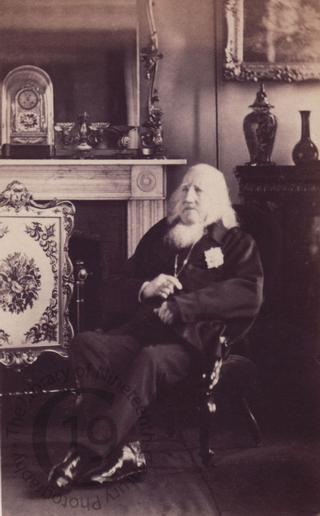
Sir James Lillyman Caldwell
A carte-de-visite portrait of General Sir James Lillyman Caldwell (1770-1863), who entered the service of the East India Company as a cadet in 1788. He eventually attained the rank of general in 1854, and the rare distinction of being the oldest officer in the military service. In the earlier part of his life he was a talented artist in water-colour, producing many Indian landscapes of merit.
In 1796 in India Caldwell married Jeanne Baptiste, widow of Captain Charles Johnston of the Madras army, and daughter of Jean Maillard of Dole, Franche-Comté. Their marriage produced one son and one daughter.
After fifty years of distinguished service in peace and war, he retired from the active list in 1837 and was created a KCB. On his return home that same year he lived chiefly at his home in Paris, 19 Place Vendôme, until his wife's death, when he bought Beechlands near Ryde on the Isle of Wight, passing his time partly there and partly at his London residence, 4 Portland Place. He sold this London property only a few weeks before his death.
He died, aged 93, at Beechlands, his residence on the Isle of Wight, on 28 June 1863. According to his lengthy obituary in the Isle of Wight Observer (4 July 1863): 'Sir James was one of the founders of the Royal Victoria Yacht Club, and was for many years one of the Managing Committee. [...] Sir James was also one of the founders of the Royal Isle of Wight Infirmary, of which he was one of the vice-presidents, being one of the largest contributors to the building and furnishing funds of that most excellent charity; so that it has lost another of its liberal supporters. But to enumerate all the good deeds of the venerable Knight would be to give a list of the public institutions and charities of the locality; therefore we have selected the two chief ones as instances, and as examples to be worthily followed. As genuine traits of a “Fine Old English Gentleman,” we may be pardoned for mentioning some of which he justly felt proud, and we fancy we now, as we write, hear his fine old soldierly voice exclaiming, as was his wont, “Depend upon it, sir, if you want to be comfortable, you must make your servants comfortable;” and he acted upon the maxim, and gave Mr Langdon, sen., the builder, almost a carte blanche to erect comfortable quarters for them. In the merry Christmas time, too, the best suite of rooms in his house was set apart for a ball and supper fit “to set before a king” for his domestics and tradesmen, which the brave old warrior used to honour with his presence, and which the third and fourth generations of his family would join. [...] Sir James extended his concern even to his horses, and at the time of his death was having some extensive stabling built in Monkton-street, so that the horses and their attendants should lack nothing for their comfort and convenience. We are afraid to pursue this subject any further, lest we should be thought sycophantic; but we assure our readers that we have not chronicled a tithe of the admiration and respect which we feel for this excellent and great man now departed from amongst us for ever.'
Photographed by Charles Oakeshott of Ryde on the Isle of Wight.
Code: 122548




